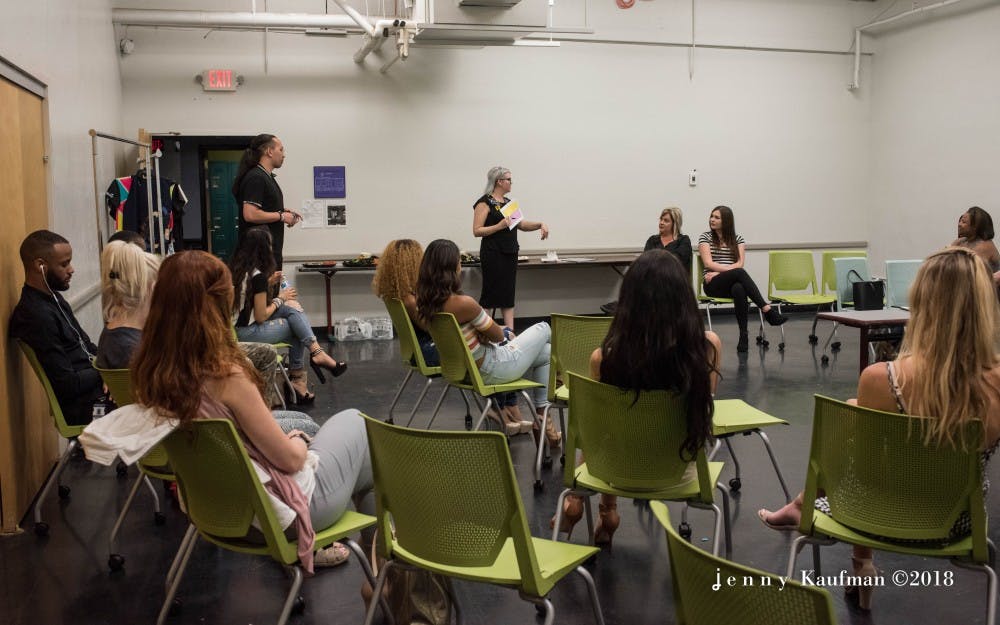April is Earth Month at ASU, so it's no coincidence that the month will also feature the first ever Arizona Eco Fashion Week.
Included as part of Fashion Revolution Week, a worldwide initiative to promote sustainable fashion, AZ Eco Fashion Week will run April 24 to 28.
The week of events will kick off with a screening of "True Cost," a documentary detailing the labor conditions and ecological impact of the fast fashion industry, and will end with a sustainability-inspired fashion show at the Fashion and Business Resource Innovation Center, or FABRIC, in Tempe.
FABRIC houses the Arizona Apparel Foundation, Arizona Fashion Source and LabelHorde, which work together to provide a location for local fashion professionals to connect and grow their businesses.
Angela Johnson, who is the co-founder of FABRIC and is known for recycling t-shirts into ball gowns and other garments, said the center's upcoming reFABRICate Fashion Show will showcase the eco-friendly collections of local designers with sustainable brands.
“Making something domestically is, just by nature, a sustainable model because you have control over it — who's making it, how it's being made and making it in small quantities,” Johnson said. “It’s not affecting and not impacting the planet as much as if you were just mass producing disposable clothing in relation to educating students about sustainable fashion.”
The week will also include a sustainability conversation hosted by ASU Business of Fashion on the Tempe campus on April 27.
Daniella Simari, a biological science junior and one of the co-founders of the Fair Trade Campaign at ASU, will be leading the conversation. She said by being more conscious of the way students spend their money and where the products they purchase come from, they can make small environmental changes.
The Fair Trade Campaign at ASU is a grassroots movement committed to increasing the availability of fair trade certified products on campus through a partnership with Sun Devil Dining and Aramark.
Read More: ASU commits to being the largest fair trade-designated university in the U.S.
“I think students are the way forward for this, especially because it's teaching students that conscious consumerism really does matter and you can have an effect,” Simari said. “You can vote with your dollars and create change in this small way, and hopefully a lot of people take this idea and run with it in their lives beyond college.”
Galina Mihaleva, a visiting fashion professor at ASU, incorporates sustainable design into her teaching through a class project where her students use jeans from Goodwill and their own closet to create multifunctional dresses in order to introduce them to the advantages of sustainable design.
“We need to teach them to be responsible, so to rethink before they even start to design,” Mihaleva said. “They need to think about the circle cycle — from where they get the material and what’s happening, to the garment and where the garment will end (up)."
Students are encouraged to use the hashtags #azecofw and #whomademyclothes during the week to participate in the sustainable fashion conversation and to be featured on the Arizona Eco Fashion Week website.
Simari said responsible fashion goes beyond ecological impact, and she hopes that people will consider that individual purchases can affect every aspect of the fashion production process.
“It's about social justice for child laborers, for the gender wage gap, for women empowerment in developing countries whose societies kind of typically oppressed them,” Simari said. “It’s about sustainability economically and sustainability environmentally."
Although the Fair Trade Campaign at ASU focuses on food, Simari said that clothing is becoming a large part of the fair trade movement.
"There's so much going on with fair trade and there are so many different ways you could play it up and it's amazing to see how many people come together just from this one policy, this one movement," she said.
Reach the reporter at chofmann@asu.edu and follow @chofmann528 on Twitter.
Like The State Press on Facebook and follow @statepress on Twitter




